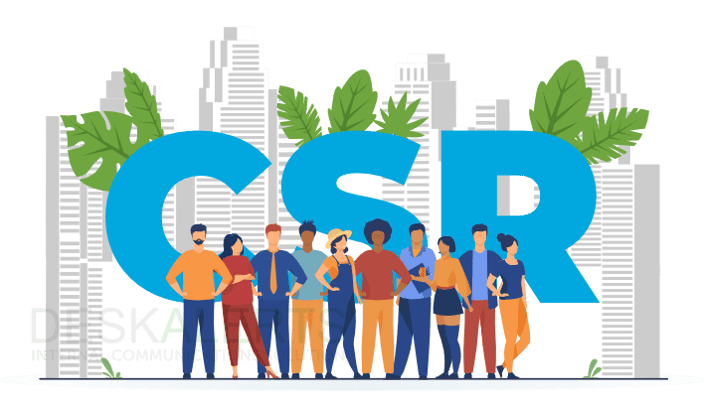
You might have heard a lot about Diversity, Equity, and Inclusion (DEI) and Corporate Social Responsibility (CSR) in recent years. What is DEI and what is corporate social responsibility? They aren’t just checkboxes; they're strategic imperatives. In today’s competitive business landscape, success hinges on more than financial prowess.
Companies are realizing that a diverse and inclusive workforce isn't just a feel-good initiative—it's a powerhouse for innovation and resilience. Simultaneously, CSR is the ethical backbone that aligns businesses with societal values, resonating with a consumer base increasingly attuned to responsible practices.
Having robust DEI and CSR strategies isn't an optional extra; it's a savvy business move. As organizations pivot towards purpose-driven models, these strategies aren't just ethical choices—they're the smart investments that define success in a world where profit and principles align.
Table of contents
What Is DEI?
Why does DEI matter?
What are the benefits of DEI?
What Is CSR?
Why does CSR matter?
What are the benefits of corporate social responsibility?
What Is DEI?
Diversity, Equity and Inclusion (DEI) are key principles that guide organizations towards creating environments that respect and value the unique perspectives and contributions of everyone, regardless of their background, identity or other characteristics. It’s a holistic approach that is aimed at fostering a just, equitable and inclusive environment.
Diversity:
Diversity refers to the presence of a wide range of identities, backgrounds, and characteristics within a group or community. These differences can include race, ethnicity, gender, sexual orientation, age, socio-economic status, physical and mental abilities and more. Embracing diversity recognizes the richness that comes from varied perspectives and experiences.
Equity:
Equity is about ensuring that everyone has fair opportunities and is treated justly, recognizing that different individuals may require different resources or support to achieve similar outcomes. It goes beyond striving for equality: equity includes acknowledging and addressing historical and systemic disparities so as to ensure that everyone has an equal chance to succeed.
Inclusion:
Inclusion is an intentional and active effort to create an environment where all individuals feel that they are welcome, valued, and heard. Inclusion involves fostering a culture where different perspectives are appreciated and welcomed, enabling everyone to fully participate in the workplace and contribute to the best of their abilities.
Organizations committed to DEI understand that embracing these principles is not only a moral imperative but also essential for achieving optimal performance and innovation among their employees. Inclusive environments empower people to bring their authentic selves to the table, fostering creativity and collaboration. Diverse perspectives also help organizations adapt to a rapidly changing world and connect with a broader range of stakeholders.
Implementing DEI initiatives involves examining and challenging existing practices, policies, and biases that may perpetuate inequality. It requires fostering a culture of openness, empathy, and continuous learning. Training programs, mentorship opportunities, and transparent communication play crucial roles in promoting DEI.
Here are five types of DEI programs to consider:
Training and education:
- Conduct regular training sessions to raise awareness about unconscious biases, cultural competency, and inclusive communication.
- Provide educational resources on diversity and inclusion topics to enhance employees' understanding.
Mentorship and sponsorship programs:
- Establish mentorship programs to connect employees with mentors who can provide guidance and support.
- Introduce sponsorship programs that advocate for the career advancement of underrepresented individuals.
Diverse recruitment initiatives:
- Implement strategies to attract a diverse pool of candidates during recruitment processes.
- Establish partnerships with organizations that focus on diverse talent pipelines.
Employee resource groups (ERGs):
- Create ERGs that provide platforms for employees to connect, share experiences, and offer one another support.
- Encourage ERGs to organize events, workshops and other initiatives that promote and celebrate diversity.
Inclusive policies and practices:
- Review and update your company policies to ensure they promote inclusivity and equity.
- Implement flexible work arrangements and accommodation policies to support diverse needs.
Why does DEI matter?
There are many reasons why DEI matters in the workplace. Understanding the DEI meaning gives companies the ability to affect not only the well-being of employees but also the overall success and sustainability of the organization as a whole.
1. Innovation and creativity
A diverse workforce brings together individuals with varied perspectives, experiences and backgrounds. Having this diversity of thought in place encourages innovation and creativity, with different viewpoints contributing to a more comprehensive and innovative problem-solving approach.
Companies that prioritize DEI are better positioned to adapt to changes, stay competitive and drive creativity in their products, services, and processes.
2. Employee engagement and satisfaction
Inclusive workplaces cultivate a sense of belonging among their employees. When people feel valued, respected and included, they are more likely to be engaged in their work.
DEI initiatives contribute to higher job satisfaction, increased morale and a positive workplace culture. This, in turn, leads to higher employee retention rates and a more motivated and productive workforce.
3. Attracting and retaining talent
In a globalized and interconnected world, talented individuals seek workplaces that prioritize diversity and equity. Organizations that actively promote DEI can attract a wider pool of qualified candidates, enabling them to recruit the top talent in their industry.
Diverse and inclusive workplaces are also more likely to retain employees, as people are more likely to stay in environments where they feel respected and have equal opportunities for growth.
4. Better customer and client relations
A diverse team is better equipped to understand and meet the needs of diverse customer bases. When they reflect the diversity of their clientele, organizations can establish stronger connections and trust with customers.
DEI efforts not only enhance the understanding of different markets but also contribute to the development of products and services that resonate with a broader audience.
5. Legal and ethical compliance
DEI isn’t just about best practices - it can often come with a legal and ethical imperative.
Many jurisdictions have regulations and laws in place to prevent discrimination and promote equal opportunities. Adhering to these guidelines is not only a legal requirement but also aligns with ethical principles, demonstrating a commitment to fairness and social responsibility.
6. Increases global competitiveness
In an interconnected global economy, organizations with diverse teams are better positioned to navigate international markets and collaborations with customers and partners from around the world.
Cultural competence and diverse perspectives are valuable assets when working with partners, clients, and colleagues from different regions and backgrounds.
What are the benefits of DEI?
When implemented effectively, DEI programs help to create a workplace that values individuals for their unique contributions and lead to improved organizational performance and societal impact.
- Diverse perspectives foster creativity and innovation, driving the development of new ideas and solutions.
- Varied experiences and backgrounds contribute to more effective and comprehensive problem-solving.
- DEI programs attract a broad pool of talent, allowing organizations to recruit employees with diverse skills and perspectives.
- Diverse workforce enhances a company's ability to understand and respond to diverse customer needs, making it more competitive in the market.
- Inclusive workplaces promote a sense of belonging, increasing employee engagement and job satisfaction.
- Diverse teams are far better equipped to navigate change and adapt to evolving business landscapes.
- A positive and inclusive work environment boosts employee productivity.
- Inclusive workplaces reduce turnover by creating a supportive atmosphere where employees feel valued.
- DEI fosters a culture of respect, openness, and fairness within an organization.
- Inclusive practices prioritize the well-being of employees, promoting a healthier work environment.
- Organizations with robust DEI programs build positive reputations, attracting both customers and investors.
- DEI programs provide opportunities for leadership development among individuals from various backgrounds.
- Diverse teams are better placed for global expansion due to their understanding of diverse cultural nuances.
- DEI initiatives help identify and mitigate unconscious biases, promoting fair treatment.
- DEI aligns with ethical business practices, demonstrating a commitment to fairness and social responsibility.
What Is CSR?
What is corporate social responsibility? CSR is like the heart and soul of a company – it's about businesses doing more than just chasing profits. It involves a company not just caring about making money but also caring about the people it employs, the communities it's a part of, and the planet we all share.
The social responsibility definition is about businesses recognizing that they're embedded in the real world, impacting real lives and understanding that they've got a role to play in making the world a better place.
First off, it's about being good to people – the employees. Companies embracing CSR want their workers to be happy and treated right. It's about fair pay, safe workplaces, and making sure everyone feels valued and included.
CSR means companies will look beyond their office, store or factory walls and see the communities they operate in. It's about giving back – not just in a charitable way but by actively making those places better. Maybe it's supporting local schools, helping out in times of need, or just being a positive force in the community.
Businesses committed to CSR think about their environmental impact, for example understanding their carbon footprint, finding ways to use less, waste less, and maybe even help heal the planet.
CSR is like a promise from businesses to be honest, open, and accountable. It involves businesses being transparent in what they do, how they do it, and how it affects everyone – from customers to employees to the surrounding community.

Why does CSR matter?
CSR matters to employees as it reflects a company's commitment to ethical and responsible practices. When a workplace is engaged in corporate social responsibility to employees, it fosters a sense of pride and purpose among them as they appreciate contributing to a positive impact on society.
CSR initiatives, whether supporting local communities or championing environmental sustainability, enhance employee morale and job satisfaction. Employees are more likely to feel connected to a company that prioritizes values beyond profit, contributing to both a positive workplace culture and a better society overall.
Here’s why CSR matters to your staff:
1. Provides a sense of purpose
CSR gives employees a sense of purpose beyond the daily grind. Knowing that their work contributes to something bigger and positive for the community or the environment makes them feel more fulfilled.
2. Community and belonging
CSR creates a workplace that feels like a community. It's not just about clocking in and out; it's about being part of a team that cares about each other and the world around us.
3. Job satisfaction
When a company prioritizes CSR, it's a clear signal that they care about more than just profits. It shows that they value employee well-being and want them to be happy in their jobs, contributing to overall job satisfaction.
4. Fairness and inclusion
CSR often goes hand-in-hand with fairness. Fair wages, fair treatment, and equal opportunities are integral to CSR. It's a nod to diversity and inclusion, recognizing and celebrating the unique contributions of each employee.
5. Pride in the workplace
Knowing that their company is making a positive impact in the community or taking steps to be environmentally responsible fills employees with pride. They become ambassadors for their workplace, proud of where they work and what it stands for.
6. Long-term job security
Companies invested in CSR are forward thinking. It's not just about immediate profits but about creating a stable and secure workplace for employees. This commitment to sustainability translates into a more secure job environment.
7. Employee engagement
CSR encourages higher levels of employee engagement. When employees see their company actively contributing to social or environmental causes, it inspires them to engage more fully in their work, knowing that their efforts align with positive values.
8. Personal growth and development opportunities
CSR often involves opportunities for personal growth and development for employees. Whether through volunteer programs or initiatives that support education, companies engaged in CSR invest in their employees' continuous learning and advancement.
9. Promotes an ethical work environment
Employees appreciate being part of an ethical environment, and when pondering "what is workplace culture," this becomes integral. CSR ensures that the company is not just focused on the bottom line but is committed to ethical practices, creating a workplace culture built on trust and integrity.
10. Attracting and retaining talent
Employers who are committed to CSR are sought out by employees. In a competitive employment market, this sets these companies apart from others and makes them more attractive options to the top talent in their industries.
Types of corporate social responsibility
In the CSR space, companies have many different options to make a positive impact. Whether it's giving back to the community, going green, or supporting ethical practices, there's lots of ways business can help contribute:
1. Economic responsibility
Within CSR's many aspects, economic responsibility is key. Businesses must stay financially sound to meet other commitments. This means making profits, delivering value to shareholders, and playing a part in economic development.
2. Legal responsibility
Organizations are expected to operate within the framework of laws and regulations that are applicable to the jurisdictions they operate in. Compliance with legal standards is a baseline for CSR, ensuring that businesses conduct their operations ethically and within the boundaries of the law.
3. Ethical responsibility
CSR includes a commitment to ethical behavior. Businesses are expected to adhere to moral principles and values and demonstrate integrity in their interactions with stakeholders and the broader society.
4. Philanthropic responsibility
Beyond legal and ethical considerations, CSR involves voluntary efforts from businesses to contribute to the well-being of society at large. This may include making charitable donations, driving community development projects or offering support for social causes that align with the organization's values.
5. Environmental responsibility
As worries about the environment grow, CSR encompasses how businesses impact ecology. Companies are under rising pressure to embrace sustainable practices, shrink their carbon footprint, and actively participate in environmental conservation efforts.
6. Stakeholder engagement
CSR emphasizes the importance of engaging with various stakeholders, including employees, customers, communities and investors. Building positive relationships with these groups is integral to a comprehensive CSR strategy.
7. Transparency and accountability
Transparency is a key aspect of CSR and involves open communication about business practices, goals and impacts. Organizations are also accountable for their actions, and CSR encourages mechanisms for assessing and reporting on social and environmental performance.
8. Socially responsible investing
CSR has influenced investment practices, with an increasing focus on socially responsible investing (SRI). Investors consider a company's CSR initiatives and performance as part of their decision-making processes.
9. Employee well-being
Part of the social responsibility for a company includes a commitment to prioritizing the well-being of its employees. This involves providing a safe and inclusive work environment, fair compensation, and opportunities for professional development.
10. Long-term sustainability
CSR promotes a long-term perspective on business operations. Sustainable practices and responsible decision-making contribute to the longevity and resilience of organizations.
Here are five types of CSR programs to consider implementing in your workplace:
Employee volunteer programs:
- Encourage employees to volunteer for community service during work hours, fostering a culture of giving back.
Philanthropic giving:
- Establish a corporate philanthropy program that supports charitable organizations through financial contributions.
Environmental stewardship initiatives:
- Implement sustainability programs, such as reducing carbon footprints, waste reduction, or adopting eco-friendly practices.
Education and skill-building programs:
- Contribute to education initiatives by supporting scholarships, mentorship programs or providing resources for skill development within the community.
Corporate sponsorships and partnerships:
- Sponsor local events, sports teams, or cultural activities, showcasing a commitment to community engagement and support.
What are the benefits of corporate social responsibility?
In a world that increasingly values social responsibility and sustainability, businesses should prioritize CSR. There are many benefits to doing so:
- CSR fosters higher levels of employee engagement as employees feel a sense of pride and connection to the company's positive impact.
- Companies that prioritize CSR create a more fulfilling work environment, contributing to higher job satisfaction among employees.
- CSR initiatives attract top talent, as individuals are increasingly seeking employers with a commitment to social and environmental responsibility.
- CSR builds a positive reputation for the company, both internally and externally, contributing to a strong brand image.
- CSR activities, such as community engagement or philanthropy boost employee morale by creating a workplace that values social responsibility.
- Diverse CSR initiatives encourage innovation and creativity as employees are inspired by the company's broader purpose.
- CSR promotes ethical decision-making throughout the orgnization by encouraging employees to align their actions with the company's values.
- Companies engaged in CSR build strong relationships with the communities they operate in, leading to a supportive and collaborative external environment.
- CSR often includes initiatives that support employee well-being, recognizing the holistic needs of people beyond their professional roles.
- Engaged and satisfied employees are more likely to be productive, positively impacting the company's overall efficiency.
- CSR encourages a forward-thinking approach, making the company more adaptable to changes in societal expectations and market trends.
- Ethical business practices associated with CSR reduce the risk of legal issues and damage to the company's reputation.
- Companies with strong CSR practices are better positioned to access global markets, meeting the expectations of diverse customer bases.
- CSR can lead to cost savings through improved resource efficiency, waste reduction, and streamlined processes.
- Socially responsible practices enhance customer loyalty, as consumers increasingly prefer businesses that align with their values.
- Companies committed to CSR often have better relationships with regulators, contributing to smoother operations and compliance.
- CSR promotes the long-term sustainability of the company by aligning business practices with the well-being of society and the environment.
***
Ignoring DEI and CSR and failing to implement appropriate strategies in the workplace means you are missing out on the profound benefits they bring. DEI ensures a vibrant, innovative workforce, propelling companies into the future with fresh perspectives and heightened creativity. On the flip side, without CSR, companies risk being seen as disconnected and outdated in a society that demands ethical and responsible business practices.
Companies that embrace DEI and CSR not only secure their place as socially responsible entities but also position themselves as leaders in a marketplace where purpose-driven practices are non-negotiable for sustained success. In essence, the cost of not integrating DEI and CSR into workplaces isn't just financial—it's a missed opportunity for growth, relevance, and a positive impact on both employees and the world at large.
FAQ
What is diversity equality and inclusion?
What does DEI stand for? Diversity, Equality, and Inclusion (DEI) are interconnected principles fostering a workplace culture that values and respects individual differences. Diversity acknowledges and celebrates varied identities, Equality ensures fairness and equal opportunities, and Inclusion promotes an environment where everyone feels valued and can contribute their unique perspectives. DEI enhances innovation, engagement, and equity.
What is meant by corporate social responsibility?
What is corporate social responsibility? It refers to a business's commitment to operating ethically and contributing positively to society. It involves practices that go beyond profit-making, addressing social, environmental, and ethical considerations. Companies embracing CSR aim to balance financial success with positive impacts on communities, employees, and the environment.
Why is CSR important?
Corporate Social Responsibility (CSR) is vital as it aligns businesses with ethical practices, benefiting society, the environment, and stakeholders. CSR enhances a company's reputation, attracts socially conscious consumers, and fosters employee engagement. It's a strategic approach that contributes to long-term sustainability, making businesses responsible and respected contributors to the greater good.
 Caroline Duncan
Caroline Duncan








